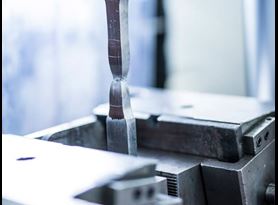When it comes to electrical components and devices, resistivity is an essential property to measure. Volume and surface resistivity testing ensures the materials used can properly insulate or conduct electricity as intended, protecting your products and the people using them.
What is volume resistivity?
Volume resistivity tells you how well a material can resist the flow of electrical current through its bulk or body. It's like measuring how difficult it is for electricity to pass through a solid cube of the material. The higher the volume resistivity, the better it can function as an insulator and prevent current leakage. This measurement is critical for evaluating insulating materials used in electronic devices and components. It ensures electrical signals travel only along the designated conductive paths without short-circuiting or safety hazards. Improper volume resistivity could lead to product failures or dangerous situations.
What is surface resistivity?
While volume resistivity focuses on the interior, surface resistivity looks at how well the material resists electrical flow along its surface. This property affects things like static charge dissipation and electrical isolation between components. For example, plastics used in electronics manufacturing need low surface resistivity to prevent static buildup which could damage sensitive circuits. Measuring surface resistivity allows manufacturers to select materials with the right conductive properties.
Key benefits of volume and surface resistivity testing
By testing volume and surface resistivity, you can have confidence that the materials you use will perform as expected in your final products. Key benefits include:
- Safety - Ensuring proper insulation prevents shock hazards and fires
- Reliability - Conductors and insulators function as designed, reducing failures
- Compliance - Meeting regulatory standards for electronics and electrical devices
- Quality - Detecting contamination or defective materials before use
- Innovation - Evaluating new insulating or conductive materials
Why choose Element?
We follow all the latest ASTM and IEC standards to accurately measure volume and surface resistivity under controlled conditions. Our expertise spans diverse industries from consumer electronics to medical devices to aerospace. Don't compromise on the fundamental properties of your products. Trust the proven testing capabilities of Element to characterize your materials properly. Contact us today to learn more about our resistivity testing services.
We follow all the latest ASTM and IEC standards to accurately measure volume and surface resistivity under controlled conditions. Our expertise spans diverse industries from consumer electronics to medical devices to aerospace. Don't compromise on the fundamental properties of your products. Trust the proven testing capabilities of Element to characterize your materials properly. Contact us today to learn more about our resistivity testing services.
Learn more

Materials Testing
Find out more about Element's comprehensive ranges of materials testing services available in the TIC sector, covering materials selection, application and performance testing as well as failure analysis testing services.

Dynamic Mechanical Analysis Testing (DMA)
Element's dynamic mechanical analysis (DMA) is a powerful tool for understanding the thermal and mechanical properties of polymeric materials.

Coatings Testing
We offer world-class materials expertise in polymers, elastomers, thermoplastics, composites, and structural adhesives. With a global reach of coatings laboratories in the UK, USA, Europe, and Asia, Element provides a comprehensive range of coatings testing services to the Energy, Aerospace, Defense, and Transportation sectors.

Differential Scanning Calorimetry (DSC)
DSC is a reliable and cost-effective method for measuring Tg, phase transitions, degree of cure, degree of crystallinity, and more.

